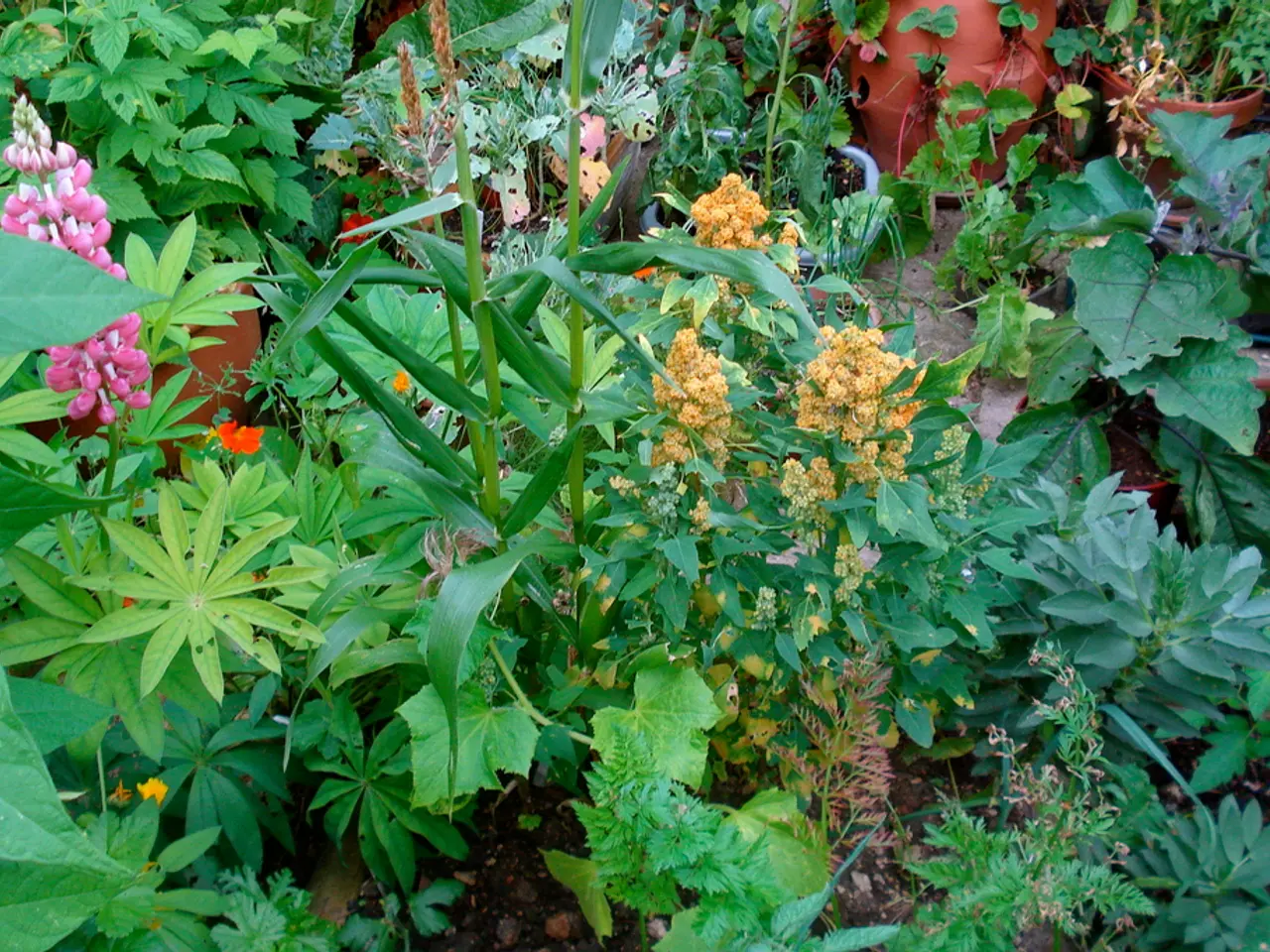Techniques for Successfully Growing Herbs in Home Garden Settings
=====================================================================
In the realm of home gardening, growing an organic herb garden can be a rewarding and flavourful venture. This article offers practical advice on effective planting methods for organic herb cultivation, focusing on soil preparation, soil pH testing, nutrient-rich soil mixes, and care for both indoor and outdoor herb gardens.
Soil Preparation
Preparing the soil is the foundation of a successful herb garden. To clear existing vegetation, remove grass and weeds manually or use sheet mulching (layering cardboard on top of the soil and covering it with compost) to block light, avoiding chemical herbicides that may harm beneficial soil organisms. Amend the soil with organic matter such as 2-3 inches of compost or well-rotted manure, working it into the top 8 inches of soil to improve fertility, drainage, and microbial life.
For raised beds, use a 50/50 mix of high-quality topsoil and compost, and water thoroughly to settle air pockets before planting.
Soil pH Testing and Adjustment
Most herbs thrive in slightly acidic to neutral soil, with a pH typically between 6.2 and 6.8. Test the soil pH beforehand, and use garden lime to raise it if it's too acidic or elemental sulfur to lower it if it's too alkaline. Apply amendments carefully and follow test recommendations to avoid nutrient lock-up.
Nutrient-Rich Soil Mixes
Blend equal parts of compost, aged manure, and quality garden soil for medicinal and culinary herbs to ensure slow-release nutrients. Sprinkle slow-release organic fertilizers such as kelp meal or rock phosphate to provide additional minerals. Monthly feeding with diluted liquid organic fertilizer supports lush, healthy growth.
Planting Methods
There are several methods for planting herbs, including starting from seeds, nursery starts, or cuttings. Seeds work well for fast-growing herbs like parsley and cilantro, started indoors or directly in soil when the frost risk passes. Nursery starts enable earlier harvests and are best for woody-stemmed herbs like rosemary and lavender. Cuttings (water-rooted for tender herbs, soil-rooted with rooting hormone for woody herbs) can be budget-friendly and effective.
Care for Indoor Herb Gardens
For indoor herb gardens, use well-draining, nutrient-rich organic potting mix. Place herbs in bright, indirect light, and keep the temperature moderate and away from drafts. Water consistently but avoid waterlogging, as many herbs dislike soggy roots. Monthly feeding with diluted organic fertilizer enhances growth. Propagate from cuttings to maintain an indoor herb supply economically.
By combining good soil structure, proper pH, nutrient-rich organic amendments, and careful planting techniques, you can cultivate a thriving organic herb garden both outdoors and indoors.
Easy-to-Grow Herbs for Beginners
Basil, mint, chives, and parsley are easy-to-grow herbs suitable for beginners. Use potting mix for herbs for basil, all-purpose potting soil for parsley, and organic potting soil for cilantro.
References:
- Fine Gardening
- Gardener's Supply Company
- Mother Earth News
- The Spruce
- A well-prepared soil base is crucial for a productive organic herb garden, whether in home-and-garden raised beds or the home-and-garden ground, as it provides the foundation for healthy growth.
- Incorporating quality science-backed practices, such as soil pH testing and adjustment, ensures that your vegetables, like organic herbs, receive the correct nutrient balance, reducing the possibility of health-and-wellness issues.
- The love for cooking and food-and-drink healthier meals can be extended into the home-and-garden by blending nutrient-rich soil mixes for herbs, resulting in both flavorful and nutrient-dense produce.
- As part of a lifestyle that values health-and-wellness, fitness-and-exercise, and food-and-drink, tending to an organic herb garden offering fresh herbs can be seen as a form of gardening, which also provides a connection to nature and the environment.
- For fashion-and-beauty enthusiasts who value aesthetics, growing an organic herb garden can offer an opportunity to cultivate visually appealing herbs, such as lavender and rosemary, to enrich home-and-garden decor.
- Adopting nutrient-rich soil practices for growing herbs can indirectly impact the quality of foods prepared in the kitchen and match the current trend of nutrition-focused cooking in the health-and-wellness community.




